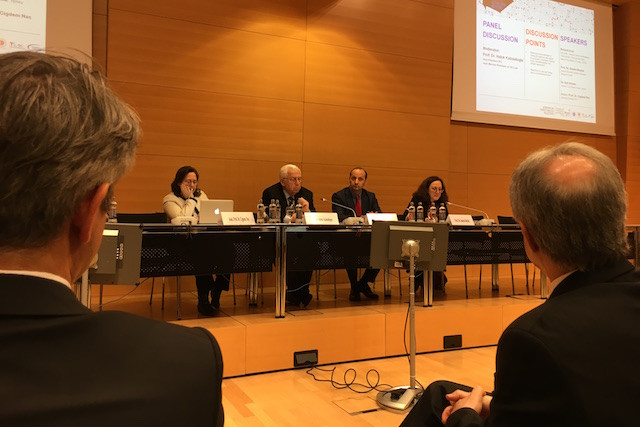The Turkey-Luxembourg Business Club organised a seminar with Turkish academics and think tankers at the Luxembourg Chamber of Commerce on Wednesday 8 March to discuss the reform of the customs union.
Turkish accession negotiations, which started in 2005, have been sluggish--none of the accession chapters have been closed. They have grinded to a halt since the failed coup attempt in July 2016.
The perceived lack of solidarity by the EU commission and some member states has deeply frustrated the Turkish government. On the other hand, the ensuing wave of arrests of judges, military personnel, civil servants, teachers, journalists and the increasingly authoritarian style of the Turkish president Recep Tayyip Erdoğan has alarmed many Europeans. The referendum on 16 April on constitutional changes has further alienated Turkey from the EU’s member states as the Turkish government is trying to rally Turkish voters living in EU countries such as Austria or Germany.
The EU-Turkey refugee deal, struck in March 2016, aims to address the flow of migrants and asylum seekers traveling across the Aegean sea from Turkey to the Greek islands. Greece was allowed to return “all new irregular migrants” to Turkey. In exchange, EU member states promised to increase resettlement of Syrian refugees residing in Turkey, accelerate visa liberalisation for Turkish nationals, and boost existing financial support for Turkey’s refugee population.
However, during this week’s conference in Kirchberg, the Turkish ambassador to Luxembourg, Mehmet Haluk Ilicak, stated that:
“There are nearly 3 million Syrians in Turkey and all benefit from free medical service and are granted official work permits. If you compare Turkey’s attitude and the position of some EU member states, which even refuse to accept a few dozen refugees, you will certainly appreciate the sacrifice made by Turkey and her generous people. Turkey has spent more than $25 billion and received less than $1 billion, including the €682 million out of €3 billion promised by the EU. We are still waiting for the EU to fulfill its financial and other commitments to Turkey, who has already fulfilled its own commitments by preventing the refugee flows towards Europe following the 18 March agreement.”
Agreement on continued negotiations
All the speakers stressed that the EU and Turkey needed each other, and that they should keep talking to each other. The all-Turkish panel emphasised that continued EU accession negotiations would give Turkey the necessary impetus for internal reforms on all levels, and warned that the current standstill was counterproductive.
Sanem Baykal of Ankara University argued that there were now internal discussions, both within the EU and in Turkey, on things like solidarity and the rule of law:
“The migration deal and the customs union seem to be the two concrete areas of cooperation right now, which might pave the way for future Turkey-EU relations in the accession process. We should not lose our focus on the overall objective, which always was to prepare Turkey for EU membership. The partners need each other because the stability of Turkey is closely linked with the stability of Europe and vice versa. When we talk about stability, the migration deal, the visa-free road map or the revision of the customs union-- they all help to provide some mutual benefits and stabilisation, especially for Turkey. We need some legal alignments in key areas in both processes, in the EU acquis and for structural reforms- these are all incentives.”
Customs union complaints
Sait Akman of the G20 Studies Center, TEPAV, argued forcefully that EU free trade agreements (FTAs) with third countries erode Turkey’s preferential treatment. There is no automatic reciprocal access to FTA partners of the EU, while the opposite is possible:
“Third country products, which come to European markets, can also enter Turkish markets without tariffs. But the opposite is not possible. Several EU partners had no political intention to sign an FTA deal with Turkey. The EU the introduced a Turkey clause which encouraged them to start negotiations, but it was not successful.”
Furthermore, Akman stressed “the asymmetric structure of the customs union”, which makes it a bit difficult for Turkey to take part and to follow the acquis and decisions in the EU trade policy area:
“It means that Turkey adapts more slowly to EU laws and often operates on sub-optimal levels as time passes, as we have more acquis on technical issues. It goes without saying that accountability and legislation would be greatly improved through a reformed customs union. We need to repair the democratic deficit in the customs union.”
Turkey is not an ordinary partner for the EU because it has a very special customs union with the EU.
Akman suggested two possible reforms: the decision and consultation mechanisms between the EU and Turkey should be improved, and the customs union should be deepened in the areas of agriculture, trade and services, like public procurement.
Baykal stressed that the negotiations on a new customs union and on Brexit will impact each other.
Visa liberalisation: quid pro quo?
Cigdem Nas of the IKV said that the most important aspect of the EU-Turkey deal has not yet materialised: visa liberalisation.
The EU had pledged to lift the visa requirements by June 2016 at the latest, if Turkey had implemented the different requirements. She argued that these visas were a burden for Turkish citizens and businesspeople, and the delays were partly based on prejudices. Visas were also a non tariff barrier.
Nas stressed that prospect of EU accession was vital for reforms in Turkey, but deplored that the political climates, neither in Turkey nor in the EU, were conducive to progress.
